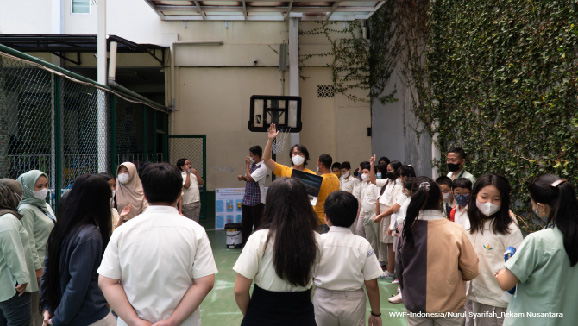

Dozens of students of Bina Tunas Cemerlang Elementary School in Bogor City gathered in their school hall, Wednesday (11/23/22). It's fun to listen to junk-themed animated movies. In the film, a child is seen in a car with his parents while consuming snacks. Afterwards, he then dumped the food packaging out of the car's glass window. The film's visualization shows garbage that is thrown away even though it is considered small, but over time it accumulates and causes the environment to become dirty and polluted, garbage accumulates until it is out of control.
"Aaah... that's a bad habbit!" said one student.
"That's make environment dirty!"
The private school does use English in its learning activities. No wonder all the students, who although still in elementary school, are already fluent in English. After the animation, Executive Director of Rekam Nusantara Foundation Een Irawan Putra guided the discussion with the students. The flow of the discussion was warm and attractive. The students seemed so excited and active in the question and answer session at the PSC Goes to School event. It is an activity organized by the PSC (Plastic Smart Cities) program, a global movement initiated by WWF and the Rekam Nusantara Foundation.
In his presentation, Een explained the various types of garbage. Starting from organic, inorganic and residual. He said the waste should be able to be sorted from home. So that it can minimize the pile of waste that enters the landfill (landfill).
"Ready to sort out the garbage? We can start with ourselves. Then invite parents at home to start sorting garbage," he said.
"Ready!!" the students said.
After the discussion session, the students were divided into two groups. One group conducted a discussion in the room with the help of pre-prepared garbage-type props. As for one other group, the discussion was held on the basketball court. Armed with the garbage in the school environment, they learned to identify various types of waste. Organic, inorganic and residual waste is put into different buckets.
Meisya, a grade 6 student, admitted that she was happy to participate in the activity. He said that through this activity he learned a lot about the types of waste and the importance of sorting from home.
"That waste can be detrimental to the environment. As small as possible, we can separate organic and inorganic waste to make a difference in this world. Start from the smallest things. At home I have different bins for inorganic and organic waste. I will continue to do this," he said.
Grade 5 student Abigael said that through this activity she learned how to sort waste in the right way. In daily activities, he said, he should be able to dispose of garbage according to the place.
"If we litter, living things that are on land or in the ocean will get sick and may die. From earlier we talked about residual, organic and inorganic waste. Residue is a garbage like that can no longer be used. Organic is food waste, inorganic waste that is not from plants. We must sort and reduce waste to care about the environment," he explained. The Coordinator of the Bina Tunas Cemerlang School, Fridarwati, said that her party was happy with the activity. Education about waste, according to him, is a new experience for his students.
"Usually they learn through books and then they can also search through google. But it's a different experience for them because they can listen to explanations from non-teachers which is good. The source of the lesson can be from anywhere. Then they can immediately practice also sorting waste," he said. Moreover, according to him, with the direct practice of sorting waste, it makes it easier for his students to understand various categories of waste. He hopes that what has been learned through these activities can be applied in everyday life.
"Maybe start with yourself, your family, then maybe in your neighbourhood." Regarding waste management, Frida admitted that so far her party has not implemented the concept of sorting. The new school is limited to providing landfills and blending organic, inorganic and residual. "We haven't applied that yet. So still yes, they have thrown garbage in one place. So far what we emphasize is that you have thrown the garbage in its place. Thats it. Not sorting this out what waste, organic to where, inorganic to where, it hasn't. Hopefully in the future it can be implemented. Maybe this way our school can also be even better at waste processing. Maybe we can sort the garbage by providing a landfill according to its type. That's a good thing," he said.
Interestingly, to reduce plastic waste, Bina Tunas Cemerlang School has its own policy. The students are required to bring their own drinking bottles and food boxes. The policy is effective in reducing the production of plastic waste. This is also in line with the PSC's vision to reduce plastic waste leakage in nature by 30% by 2030.
"The policy of students bringing their own tumblers and food boxes, has been implemented for a long time. In our school, there is indeed no canteen. So we ask them to bring their own food. Buying packaged drinks, then packaged food, we are indeed trying to reduce it, one of which is by bringing our own food from home. It has been implemented for a long time," he explained.
After the PSC Goes to School activity, Frida hopes that her students can understand more about waste issues. His party is also committed to starting to sort waste in its school environment by providing landfill facilities that are distinguished according to their type. "Hopefully they can remind themselves at least and also invite their parents to start sorting garbage," he concluded.***